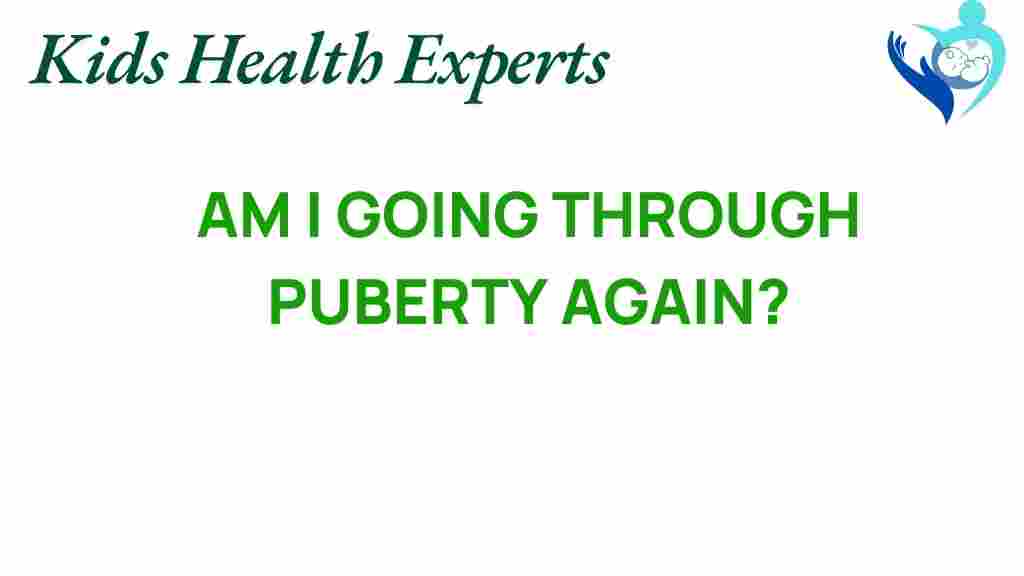Are Adults Experiencing Puberty Anew? Understanding Hormonal Changes
As we traverse the journey of life, the phases of growth and change can often feel cyclical. While puberty is typically associated with adolescence, many adults report experiencing significant emotional shifts and hormonal changes that resemble the turbulence of their teenage years. This phenomenon has led to intriguing discussions about whether adults are experiencing a second puberty. In this article, we will delve into the relationship between adulthood, hormonal changes, midlife crises, emotional shifts, and identity growth during this transition.
Understanding Puberty and Its Impact
Puberty is defined as a period of physical development and maturation that occurs primarily during adolescence. It is characterized by hormonal changes that lead to sexual maturation and various emotional shifts. However, the concept of puberty doesn’t just apply to teenagers. Adults can also undergo profound changes that mimic the symptoms of puberty, especially during midlife.
Hormonal Changes in Adults
As adults age, various hormonal changes can occur, impacting their physical and emotional well-being. Key hormones involved in adult changes include:
- Estrogen: In women, estrogen levels fluctuate significantly during perimenopause and menopause, leading to various symptoms such as mood swings, hot flashes, and changes in libido.
- Testosterone: In men, testosterone levels gradually decline with age, which can affect mood, energy levels, and even physical health.
- Cortisol: The stress hormone cortisol can also affect adults, especially during times of significant life changes, contributing to emotional upheaval.
These hormonal shifts can lead to various physical and psychological challenges, prompting some to liken the experience to a second round of puberty.
Signs of Adult Puberty: Emotional Shifts and Identity Growth
Many adults find themselves undergoing emotional shifts similar to those experienced during adolescence. These changes can manifest in various ways:
- Increased Anxiety: Adults might experience heightened anxiety levels, reminiscent of teenage angst.
- Identity Crisis: Just as teenagers grapple with their identities, adults may revisit questions about their life purpose, career paths, and personal relationships.
- Relationship Dynamics: Changes in hormone levels can affect intimacy and relationship satisfaction, similar to the challenges faced during teenage years.
- Desire for Growth: Adults often feel a renewed desire for personal growth, education, and exploration of new interests.
Recognizing these signs is crucial, as they can indicate a need for self-reflection and personal development.
The Midlife Crisis: A Common Transition
One of the most talked-about transitions in adulthood is the midlife crisis. This phase often encompasses a reevaluation of life achievements and future aspirations. Factors contributing to a midlife crisis include:
- Age-Related Health Concerns: Health issues can prompt a reconsideration of life choices.
- Career Dissatisfaction: Many adults feel unfulfilled in their careers and yearn for a change.
- Relationship Struggles: Marital issues or the challenges of parenting adolescents can lead to emotional upheaval.
- Existential Questions: Adults often reflect on their life’s meaning and purpose, leading to profound emotional shifts.
Understanding the midlife crisis as a natural part of life can help individuals navigate these changes more effectively.
Health Implications of Hormonal Changes
Hormonal changes in adults can have significant implications for health, such as:
- Weight Gain: Fluctuating hormone levels can lead to changes in metabolism, often resulting in weight gain.
- Bone Health: Decreased estrogen and testosterone can affect bone density, increasing the risk of osteoporosis.
- Mental Health: Anxiety and depression may increase during periods of hormonal change, necessitating professional support.
- Cardiovascular Health: Hormonal fluctuations can impact cardiovascular health, making regular check-ups essential.
Maintaining health during these transitions is crucial for overall well-being.
Steps to Manage Adult Puberty Symptoms
If you find yourself experiencing the emotional shifts and hormonal changes typical of adult puberty, consider the following steps:
1. Self-Reflection
Take time to assess your emotional state and identify specific triggers. Journaling can be an effective way to process feelings.
2. Seek Support
Engage with friends, family, or professionals who can offer support. Discussing your feelings can alleviate some of the burdens.
3. Prioritize Health
Focus on a balanced diet, regular exercise, and sufficient sleep. Consider consulting healthcare providers to monitor hormonal health.
4. Explore New Interests
Find new hobbies or activities that excite you. This can foster a sense of purpose and identity.
5. Consider Professional Help
If emotional shifts become overwhelming, consider seeking therapy or counseling. Professionals can provide tools and strategies to cope with changes.
Troubleshooting Common Issues
During this period of transition, you may encounter specific challenges. Here are some troubleshooting tips:
- Persistent Mood Swings: If mood swings are severe, discuss with a healthcare provider about potential hormonal imbalances.
- Sleep Disturbances: Implement a calming bedtime routine and limit screen time before bed.
- Relationship Strain: Open communication with your partner can help address underlying issues and strengthen your bond.
- Loss of Motivation: Set small, achievable goals to reignite your passion and purpose.
The Importance of Community
Connecting with others who are navigating similar experiences can be invaluable. Joining support groups, whether online or offline, can provide a sense of belonging and understanding. Many people find that sharing their experiences helps alleviate feelings of isolation.
For more information on navigating midlife changes, consider visiting this resource.
Conclusion: Embracing the Journey of Growth
In conclusion, while adults may not experience puberty in the traditional sense, the hormonal changes and emotional shifts they encounter can mirror those of adolescence. Understanding these changes as a part of life’s natural transitions allows for personal growth and identity exploration. By recognizing the signs and taking proactive steps, adults can navigate this unique phase with resilience and a renewed sense of purpose.
As we embrace these transitions, let us remember that growth is a lifelong journey. Whether it’s through health, emotional well-being, or identity, each phase offers opportunities for reflection and renewal. If you’re seeking to understand more about your health during this time, consult with professionals and consider engaging with supportive communities.
This article is in the category Growth and created by KidsHealthExperts Team
